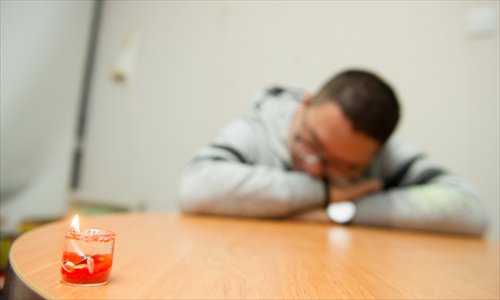Occupational fatigue
Are you suffering from burnout?

Burnout syndrome, which refers to psychological exhaustion as a result of work stress, is a relatively new concept in China. Photo: Li Hao/GT
Hugh Wu took a deep breath as he left the office. Twinkling lights adorned the streets in celebration of the New Year, but Wu was too tired to even notice.
It was 9 pm, and he had spent the entire day editing videos in an oppressive little cubicle. He was supposed to have clocked off at 6 pm, but at the large Shanghai-based media company where he is employed, working overtime is simply part of the routine.
"For a couple of months, I've felt mentally drained, frustrated and unmotivated in my job," said Wu. "It's burnt me out."
While widely used in the West, burnout syndrome, translated as ranjin zonghezheng, is a relatively new term in China.
Originally coined by American psychologist Herbert Freudenberger in the 1970s, it refers to chronic psychological exhaustion, generally as a result of occupational stress when the realities of a job do not match up to one's ideals or ambitions.
Symptoms of burnout, according to an article by Freudenberger that appeared in Scientific American Mind in 2006, include increased aggression, neglecting basic needs like eating and sleeping, alienating oneself from friends and family, disengagement, and finally, a loss of self-esteem, motivation and hope.
A recent study in the International Journal of Stress Management suggested that it could be considered a type of depression.
In China, burnout syndrome has been gaining more public attention after it appeared in an article titled "20 Unnamed Medical Social Syndromes" in popular Chinese culture and lifestyle magazine New Weekly in May.

Some experts say that the way our institutions are organized, in which many have to work long hours with little down time, is responsible for the prevalence of burnout. Photo: Li Hao/GT
A case study
Wu said that he started feeling burnt out because he is constantly overloaded with work, and his job doesn't give him any fulfillment. He began working at his present company in March, after returning from the US, where he spent three years studying photography. Hired by one of China's largest media companies as a photographer, he thought it would be a dream job.
In July, he requested a transfer to the video production department. He was assigned a position as a video editor.
"It completely differed from what I imagined," he said. "When I asked for the transfer, I thought I would be outside filming videos."
As was the case when he was working as a photographer, Wu frequently stayed at the office until late, editing video.
"At the beginning, I liked sharing the videos we made with my friends on social media, but now I never do that. Any sense of accomplishment has been overwhelmed by the dull and demanding work. There's no creativity in the work anymore. I just fullfil the tasks," said Wu.
Wu said he had also developed a cynical, belligerent attitude toward his boss.
"Today, when he asked me to re-edit a video, I just left the office," he said.
Burnout in China
As burnout remains a relatively new term in Chinese medical discourse, there is little information at present about the prevalence of the syndrome in the country.
However, Peng Guoqiu, a psychologist with the First Affiliated Hospital of Chinese PLA General Hospital, estimated based on his experience that approximately 10 percent of employees in China experience chronic work fatigue. He said that such complaints were particularly common in big cities like Beijing and Shanghai, where competition for jobs and promotion is fierce.
"When employees come up against obstacles in their career, whether it is failing to get a promotion, general dissatisfaction with their job, or feeling as if they are underpaid or underappreciated, they can feel drained and worn out," said Peng. "Symptoms can include diminished capability at work, from having to deal with the many demands of a competitive workplace."
Also contributing to burnout, said Peng, are the social pressures of modern life in China, such as the relentless drive to make money, the daily grind of long commutes to and from work, and constant concerns about air pollution.
Effects on life outside work
One of the most harmful effects of burnout, according to Freudenberger's explanation of the syndrome, is the way it can affect an individual's life outside of work.
Since returning to her job in the film industry after giving birth in June, Hou Jiajing has found it difficult to balance her work life with her home life. She said that she had trouble sleeping and suffered chronic shoulder pain that was linked to stress. Exacerbating problems, her son was recently diagnosed with a cyst on his head.
"I've lost interest in a lot of things [that I used to enjoy], and feel a complete lack of creativity," said Hou, 31. "Rushing back and forth between home, office and hospital, I've become physically and mentally exhausted. I find it difficult to concentrate and completely listless when I'm at work."
Hou said that she had even stopped seeing her friends. One of the tendencies of burnout is for individuals to isolate themselves from social interaction.
"My husband and I used to meet up with friends every weekend, but we haven't seen friends recently," said Hou. Adding to her sense of stress and helpless, said Hou, was the fact that she saw no way out.
"I used up all of holidays for my maternity leave so it is difficult for me to take any more days off," said Hou. "When I do have days off, it's to take my son to hospital."
Diagnosis and definition
One of the difficulties of assessing burnout is that there is still no consensus as to how it should be defined or classified. It is not recognized as a distinct disorder in the Diagnostic and Statistical Manual of Mental Disorders (DSM), the standard reference text for mental health workers in the US. A study undertaken by researchers Renzi Bianchi, Irvin Sam Schonfeld and Eric Laurent that appeared this year in the International Journal of Stress Management showed that around 90 percent of workers with burnout also met the diagnostic criteria for depression.
Suleika Jaouad, a New York Times Columnist who has documented her battle with leukemia in a series of blogs under the title "Life, Interrupted," noted that she was first misdiagnosed as having "burnout syndrome," before later being correctly diagnosed.
Some experts have suggested that the difficulty of defining burnout as a psychological disorder was due to the fact that it was not only a mental affliction but an institutional one.
In the findings of a study of cruise ship workers published in an article titled "Becoming a Character for Commerce," Sarah J. Tracey, a professor at Arizona State University, writes: "Understanding burnout to be personal and private is problematic when it functions to disregard the ways burnout is largely an organizational problem caused by long hours, little down time, and continual peer, customer and superior surveillance."
Combating burnout
Ji Yuan, a time management coach, said that an increasing number of clients came to him complaining of work fatigue and burnout.
Based on his experience, he attributed the rising incidence of work-related exhaustion to the organizational structures and pressures of modern life, where most employees are rarely able to take more than a day or two off work at a time, which is insufficient for proper rest and recovery.
"[Furthermore], the traditional pattern of separating time for work, time for meals and time for rest have been disrupted so as to become irregular and abnormal," said Ji. "When people find it difficult to cope with daily life, it leads to procrastination. Procrastination [can be a symptom] of burnout."
One strategy for warding off burnout, said Ji, was to better manage one's time and develop healthy habits. By organizing one's time, a person could deal with their stress better, rather than becoming overwhelmed.
"Writing a 'to-do' list each day can help people to organize and prioritize their work," said Ji. "People should also write a daily dairy, to reflect on what they have done in a day and their feelings about how the day went."
Six Ways to Boost Your Energy in 2015
1. Control stress. Although you may have a lot of work each day, it is important to reflect and recognize the advancement you have made in personal development.
2. Set a role model. Separate your goals into small chunks and achieve them one by one.
3. Know your capabilities and your key skills in work. This will help you lighten your load and concentrate on the things you are interested in.
4. Make regular exercise into a habit.
5. Pay attention to your health. Avoid smoking, limit alcohol, drink plenty of water and use caffeine to your advantage, eating food with less sugar and salt.
6. Go out with friends who can be a crucial support for coping with the problems of daily life.